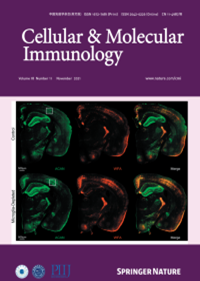肠源性巨噬细胞通过TREM1信号将心脏骤停后肠道损伤与脑损伤联系起来。
IF 19.8
1区 医学
Q1 IMMUNOLOGY
引用次数: 0
摘要
脑损伤是心脏骤停幸存者死亡和残疾的主要原因,其中浸润性巨噬细胞引发的神经炎症起着关键作用。在这里,我们试图阐明巨噬细胞浸润大脑的起源及其在心脏骤停/心肺复苏(CA/CPR)后的作用机制。野生型或光转化型Cd68-Cre:R26-LSL-KikGR小鼠进行10分钟的CA/CPR,评估肠源性巨噬细胞向大脑的迁移。通过转录组测序,鉴定巨噬细胞浸润脑,触发髓样细胞1受体表达(tre1)的关键促炎信号。经药物干预后,进一步评估TREM1对ca /CPR后脑损伤的影响。采用16S rRNA测序检测CA/CPR后肠道生态失调。通过光转化实验,我们发现小肠来源的巨噬细胞浸润大脑,在CA/CPR后继发性脑损伤的触发中起关键作用。浸润的外周巨噬细胞显示TREM1水平上调,我们通过靶向TREM1的药物干预进一步揭示了肠源性TREM1+巨噬细胞在ca /CPR后脑损伤中的重要作用。此外,在CA幸存者中观察到TREM1表达上调与神经预后不良密切相关。机制上,CA/CPR在早期引起肠杆菌大量扩增,通过释放脂多糖激活巨噬细胞上的toll样受体4,从而点燃肠道TREM1信号。我们的研究结果揭示了CA/CPR后肠道和大脑之间必不可少的相互作用,并强调了靶向TREM1+小肠源性巨噬细胞作为减轻CA/CPR后脑损伤的新治疗策略的潜力。本文章由计算机程序翻译,如有差异,请以英文原文为准。

Gut-derived macrophages link intestinal damage to brain injury after cardiac arrest through TREM1 signaling
Brain injury is the leading cause of death and disability in survivors of cardiac arrest, where neuroinflammation triggered by infiltrating macrophages plays a pivotal role. Here, we seek to elucidate the origin of macrophages infiltrating the brain and their mechanism of action after cardiac arrest/cardiopulmonary resuscitation (CA/CPR). Wild-type or photoconvertible Cd68-Cre:R26-LSL-KikGR mice were subjected to 10-min CA/CPR, and the migration of gut-derived macrophages into brain was assessed. Transcriptome sequencing was performed to identify the key proinflammatory signal of macrophages infiltrating the brain, triggering receptor expressed on myeloid cells 1 (TREM1). Upon drug intervention, the effects of TREM1 on post-CA/CPR brain injury were further evaluated. 16S rRNA sequencing was used to detect gut dysbiosis after CA/CPR. Through photoconversion experiments, we found that small intestine-derived macrophages infiltrated the brain and played a crucial role in triggering secondary brain injury after CA/CPR. The infiltrating peripheral macrophages showed upregulated TREM1 levels, and we further revealed the crucial role of gut-derived TREM1+ macrophages in post-CA/CPR brain injury through a drug intervention targeting TREM1. Moreover, a close correlation between upregulated TREM1 expression and poor neurological outcomes was observed in CA survivors. Mechanistically, CA/CPR caused a substantial expansion of Enterobacter at the early stage, which ignited intestinal TREM1 signaling via the activation of Toll-like receptor 4 on macrophages through the release of lipopolysaccharide. Our findings reveal essential crosstalk between the gut and brain after CA/CPR and underscore the potential of targeting TREM1+ small intestine-derived macrophages as a novel therapeutic strategy for mitigating post-CA/CPR brain injury.
求助全文
通过发布文献求助,成功后即可免费获取论文全文。
去求助
来源期刊
CiteScore
31.20
自引率
1.20%
发文量
903
审稿时长
1 months
期刊介绍:
Cellular & Molecular Immunology, a monthly journal from the Chinese Society of Immunology and the University of Science and Technology of China, serves as a comprehensive platform covering both basic immunology research and clinical applications. The journal publishes a variety of article types, including Articles, Review Articles, Mini Reviews, and Short Communications, focusing on diverse aspects of cellular and molecular immunology.

 求助内容:
求助内容: 应助结果提醒方式:
应助结果提醒方式:


